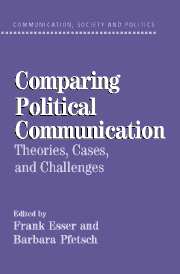Book contents
- Frontmatter
- Contents
- Contributors
- Comparing Political Communication
- INTRODUCTION
- I THEORIES AND METHODS
- 2 Americanization, Globalization, and Secularization: Understanding the Convergence of Media Systems and Political Communication
- 3 Transnational Trends in Political Communication: Conventional Views and New Realities
- 4 Comparing Mass Communication Systems: Media Formats, Media Contents, and Media Processes
- 5 Designs and Methods of Comparative Political Communication Research
- II CASES
- III PERSPECTIVES AND CHALLENGES
- Author Index
- Subject Index
- References
5 - Designs and Methods of Comparative Political Communication Research
Published online by Cambridge University Press: 24 November 2009
- Frontmatter
- Contents
- Contributors
- Comparing Political Communication
- INTRODUCTION
- I THEORIES AND METHODS
- 2 Americanization, Globalization, and Secularization: Understanding the Convergence of Media Systems and Political Communication
- 3 Transnational Trends in Political Communication: Conventional Views and New Realities
- 4 Comparing Mass Communication Systems: Media Formats, Media Contents, and Media Processes
- 5 Designs and Methods of Comparative Political Communication Research
- II CASES
- III PERSPECTIVES AND CHALLENGES
- Author Index
- Subject Index
- References
Summary
Some “25 years after ‘Extending the Frontier’” (Gurevitch and Blumler 1990), a sophisticated discussion about designs and methods in comparative communication research has not even begun. This delay is rather astonishing if one takes into account the huge number of publications on this topic in other social sciences – especially in political science, psychology, and sociology. Surprisingly, most of the literature does not take into account the research done in neighboring disciplines. Przeworski's and Teune's publication of 1970 is one of the few exceptions: their research approach is known across disciplines, even though there are some studies that replicate their ideas (Rosengren et al. 1992, 275).
The lack of shared knowledge across disciplines is all the more suprising if one considers the similarities in making international comparisons in the social sciences. In the field of communication research, Gurevitch (1989); Blumler, McLeod, and Rosengren (1992); and Schmitt-Beck (1998) have published seminal works on this subject. In political science, Hartmann (1995), van Deth (1998), and Przeworski and Teune (1970, especially 3–16) have also made important contributions. In psychology, van de Vijver and Leung (1997; 2000) and the cross-cultural research methods series (edited by John W. Berry and Walter J. Lonner since 1975) offer interesting insights. Nowak (1989) and Kohn (1989a; 1989b) have produced well-known sociological works in this field.
Obviously, the approaches of the social sciences differ, because they focus on the problems particular to each discipline.
- Type
- Chapter
- Information
- Comparing Political CommunicationTheories, Cases, and Challenges, pp. 87 - 112Publisher: Cambridge University PressPrint publication year: 2004
References
- 41
- Cited by



